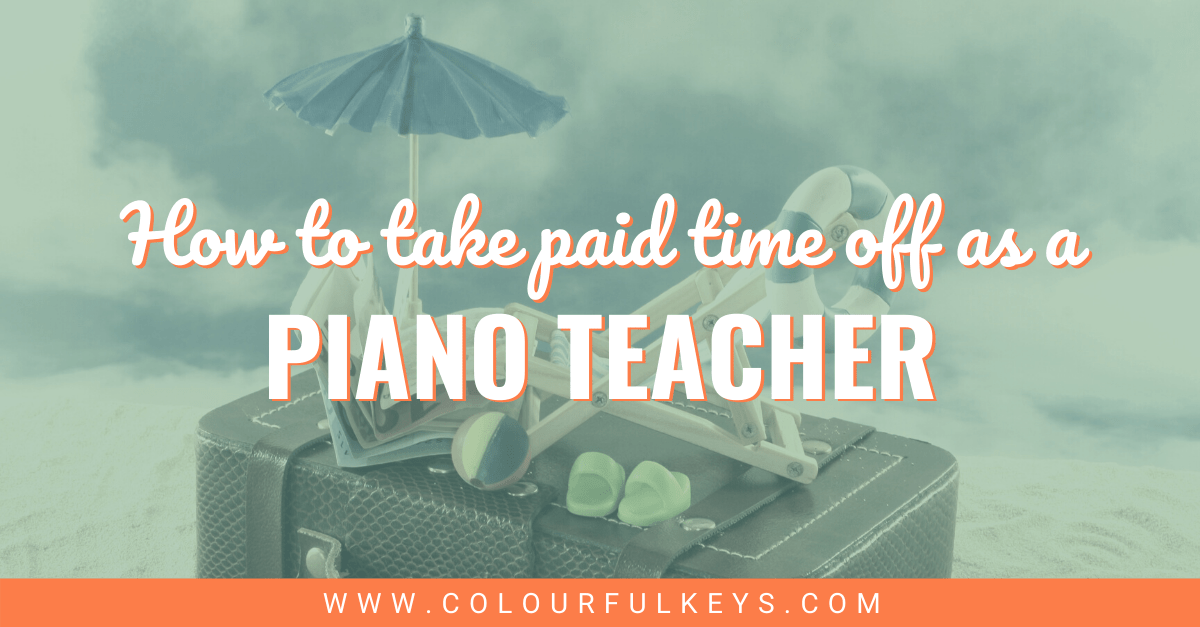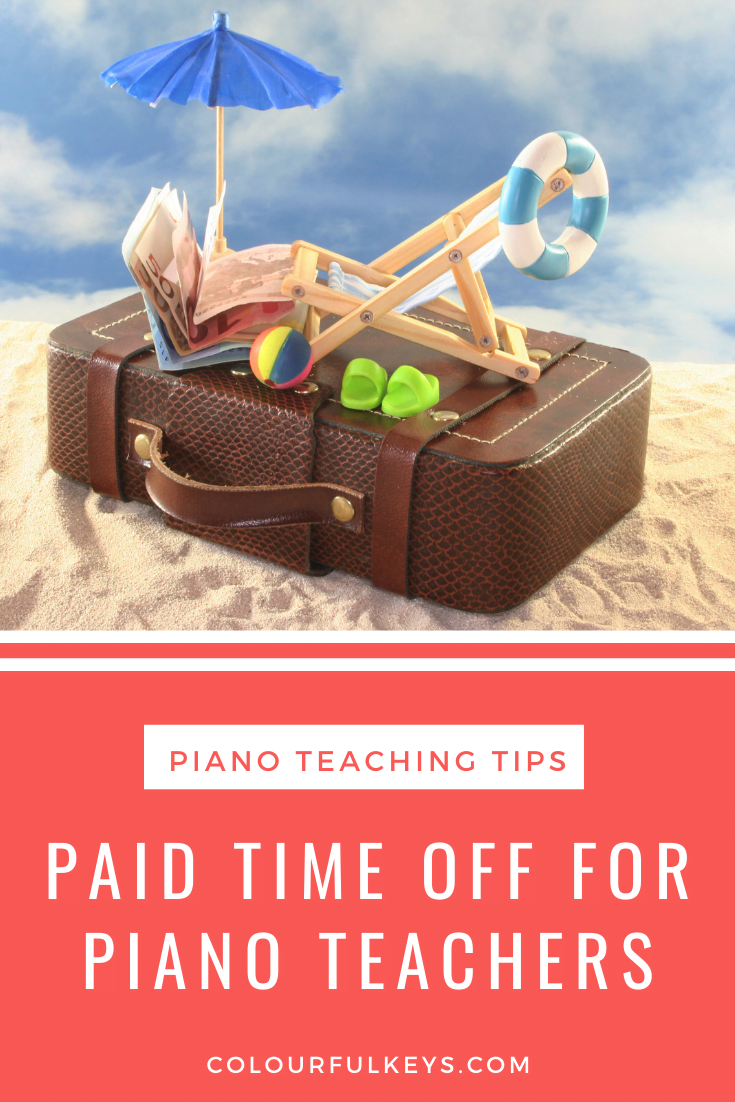Do you wish you could take paid holidays and sick leave? Think paid time off is just a pipe dream for self-employed piano teachers like us? I have the solution for you.

⬆️ Listen to the podcast above or keep on reading, whichever fits your style. ↙️
I learned about the idea of “flex weeks” many years ago now from the wonderful Wendy Stevens. My approach has evolved slightly from that original inspiration, so in this article I’ll go through how I allow for paid holidays or sick leave in my teaching calendar.
Step 1: Make Your Teaching Calendar
Before you account for holiday pay or sick leave as a piano teacher, you’ll need to know the regular weeks on your calendar. You can find calendar templates in many applications, like in Google Sheets’ templates section.
Work out which weeks will be studio holidays and grey-out those days. Then, add numbers to the start of your teaching weeks so you know how many there are and can easily see the week you’re in as you go through the year.
Here’s my 2020-2021 calendar for my studio so you can see how this looks.
I also have the group workshops and concerts marked in but that might not be necessary for your studio.
Step 2: Take Away Holiday and Sick Leave
As you can see in the calendar, we had 38 available teaching weeks in the year. I like to allow for 2 paid holidays or sick leave weeks as a music teacher. So instead of charging for all 38 weeks, I worked out the fees based on 36.
My students have 2 options to pay their fees: monthly or semesterly. The fee sheet which I distributed to them along with their registration forms last summer had both of these options for payments calculated based on 36 lessons this year.
This isn’t complicated maths. But it is powerful because it gives you flexibility.
Put it in your policies
While we’re on the topic of documents and calculations, please make sure this is clearly laid out in your policies and that you explain it directly to families – don’t just assume they’ll actually read the policies.
They need to understand that these weeks off have already been accounted for in their tuition. Surprises are not a good business plan.
Need help crafting your studio policies? You’ll find all that and more on my Piano Studio Business hub page.
Step 3: Pay Yourself a Regular Salary
Now I’m sorry to be the bearer of bad news but you’re going to have to manage that money as it comes in.

Employees have their bosses to hold back money and pay them at regular intervals. But if you’re your own boss, you have to take on that responsibility and re-frame your perspective.
It’s not that we don’t get paid at all for some weeks of the year. It’s that we don’t get paid at regular intervals.
Sure, you can have your families pay you in 12 monthly installments so it feels more like having a salary. But even if you do that it won’t come in one big lump the way it would if you were salaried.
The more effective option is to have a separate business account and personal account and set it up so that you get paid by the business each month. Make it the same sustainable amount every month and watch the peaks and valleys of stress become level.
Step 4: Keep track throughout the year
There is one part of paid time off which is more complicated for us piano teachers: It matters which days we take off.
If we were working in an office, we could take every one of our sick days on a Tuesday and likely no one would care. (They might have some conspiracy theories…but it probably wouldn’t affect the business.)
But if we take 2 weeks of Tuesdays off then the students scheduled on Tuesday will get a very sour taste in their mouths.
So, you will need to track which days you have taken off throughout the year. Not a big deal, just keep a note of it somewhere so you can even things out. 🙂
Holiday and Sick Leave FAQs
What if I don’t use it all?
If I have any leftover I simply use it at the end of the year and finish a little early. If I only used some days but not others I’ll have a slightly patchy week at the end of the year when I work, for example, just Friday and Saturday that week.
What if I need more?
If you go beyond the paid holidays you’ve planned for, you will need to either reschedule or refund the students for those lessons. This is what’s fair as the students will have paid you for a service you cannot provide.

Yes, this may sting. If you’re worried about this possibility you have 2 options:
- Allow for more paid holidays when you plan your fees
- Set aside a certain percentage of your income each month into a business emergency fund that you can use for these instances
But, wait, you said no makeup lessons! Are we not breaking that rule here?
When I talk about (ok, go on and on about!) not giving makeup lessons, I’m referring to the student’s cancellations. If you are going to be missing the lesson, that’s another story entirely.
Part of your student’s fees goes to reserving their spot in your schedule each week. When you cannot be available for their lesson at that time, you are not holding up your side of that agreement. Therefore, you should reschedule or refund those lessons if they have not been allowed for in your fee structure.
Do you account for paid holidays and sick leave as a Music Teacher?
I’d love to hear how you handle paid time off for piano teachers. Share your ideas in the comments below. 🙂

I, too, learned of this schedule from Wendy Stevens several years ago, and it changed my life! I schedule 38 lessons Aug-July. I have plenty of flexibility within the remaining weeks if anything comes up, Students may pay monthly or bi-annually. They understand that they’re paying only for the 38 scheduled lessons in equal installments. Everyone’s budget is happy, especially mine when summer rolls around!
😀
I don’t see July and August on your calendar. Do you typically take those two months off?
Yes, I do. More on this here if you’re interested https://colourfulkeys.ie/vmt043-how-to-keep-your-music-studio-income-steady-in-the-summer/
What if students decide they want to quit part way through the year?
As in, do I refund these lessons somehow? No. They are signing up for a full year so if they quit they do not get a refund for any outstanding lessons.